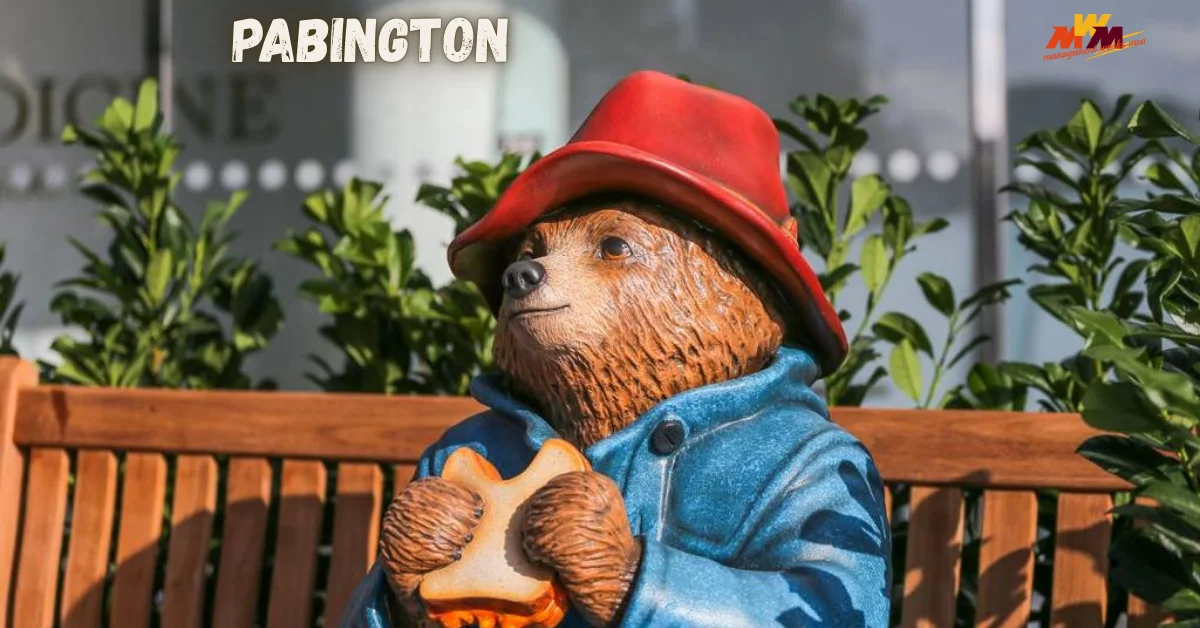This article is written by someone who has spent their life practicing the arts of storytelling and cultural research to bring to surface the beauty and meaning behind names, traditions and histories. With a passionate interest in the relationship between heritage and contemporary life, the author examines the ways in which culture, language, and imagination play a role in the formation of identity. The aim is inevitably to offer readers thoughtful stories that go beyond the mundane, which will inspire them to rediscover the value of their heritage in their own lives.
Introduction
There are names that immediately awaken curiosity, and with them, a echo of history, mystery and silent significance, and Pabington is one such name. It is a word that is both familiar and mysterious, a word that has a connection to the English roots and yet possesses the weight of eternity. Be it visualized as a centuries-old village nestled in the rolling hills of the countryside, a family name passed down through generations, or a cultural symbol evoking a sense of belonging and tradition, Pabington possesses a distinctiveness that renders it both captivating and deserving of a deeper exploration.
In an era where much of our world may seem fleeting and fast-paced, names like Pabington serve as a reminder of the enduring narratives, communities, and identities that shape us. When we start to delve into the meaning of a word like Pabington, we quickly discover that it is not just a matter of a simple definition or geographical location. Rather, it is about appreciating the cultural import of names, how they can be used as identity markers, and how they can provide fertile ground for the imagination across generations.
Pabington asks us to look back at history, to envisage communities where tradition was strongest, and to consider how such names can be given new meaning in modern times. This article embarks on a lengthy journey through the multifaceted dimensions of Pabington, delving into its historical background, cultural significance, literary and community role, and contemporary relevance.
The Historical Roots of Pabington
The history of the surname Pabington is connected to the way people’s names were created and used in medieval England. In those days surnames and village names frequently had a rich meaning, containing elements of personal names, natural characteristics and references to settlement. As the suffix ton is common in English placenames and meant farmstead or settlement, it must therefore be concluded that Pabington or something similar had its origins in the name of a person named Pabing, or a family with that name, becoming the name of a settlement or community.
Thus, Pabington may have been a name for “the farm or village of Pabing’s people.”Such names have not been picked at random. They were one thread in a whole cloth of life that bound people to the soil, to family, and to history. To be Pabingtonian was not only to live in a particular place but to belong to a bloodline and to share in a way of life. The rhythm of farming, the transmission of traditions, the gathering of families for events that occur seasonally, all contributed to the identity behind the name. In this sense, Pabington is a fragment of living history, reminding us how identity was in community and environment.
Pabington as a Place for Imagination
Even though one cannot place Pabington on the map of today’s world, the sound of the word is enough to evoke a image of a place. It is easy to imagine it as a tranquil, picturesque English village (which it is) with its winding lanes lined by stone cottages, its ivy crawling over the walls of houses that have stood for centuries, and its church bell ringing gently over green fields. In this fictional Pabington, life is lived at the gentle pace of nature itself, with villagers coming together at harvest festivals, markets full of local trade and children frolicking in flower-strewn meadows.
The vision of Pabington is not just about geographical imagination, but of the desire that many people have for rootedness and simplicity. In literature, in art and even in popular culture, fictional villages like Pabington become symbols of a longing for a way of life where community was vital and where people were tied together not only by necessity but by shared traditions and a sense of belonging. Pabington is a place where the modern hustle and bustle of time calms down and where heritage is retained in the daily hum of life.
Pabington in Surnames and Family Identity
Last names like Pabington also have their roots in history and their ancestors’ narratives. For many, the discovery of a name like Pabington in their family history can lead to an entire world of genealogical discovery. It may have its roots in ancestors who were farmers, or who worked in local trades, or who migrated over regions and continents. So the name would have been handed down from generation to generation, evolving in spelling but always maintaining the spirit of its etymology.
The importance of such surnames is that they can help unite people to their past. For those who bear the name as a proud legacy, the knowledge that their ancestors were also Pabington can be a source of pride, as much as a thread running back through the centuries to medieval fields and village life. In this way, Pabington is not only an artifact of individual identity, but a repository of history, preserving the legacies of the people who lived before.
Cultural Symbolism of Pabington
Culturally, Pabington is a name, but more than that. It is symbolic of the preservation of the values of heritage, tradition and continuity. That names in human society are never just labels but words condensed into a story goes without saying. They are as much a reflection of the homelands people came from, the occupations they practiced, the families they belonged to and the histories they sought to preserve.
Pabington then represents more than just one community or family. It addresses a universal human need of belonging. The name Pabington reminds one of a place to anchor one’s roots, of memory and tradition that are the source of identity, and of strong ties that link people over time. It reminds us of the richness of cultural heritage, and the ways in which language, history and memory intertwine.
Pabington in Modern Interpretation
Even though names like Pabington are ancient, they are not at all irrelevant today. On the contrary, they still stimulate creativity and imagination. Another example could be a business that is focused on tradition and quality, such as the name Pabington & Co. could be used to create a brand that sells high-quality, artisanal goods with a sense of tradition. It could be the name of a boutique hotel or retreat that promises its guests an experience steeped in elegance and old-world charm. Writers too may draw inspiration from such a name, using it to craft fictional estates or villages that possess an aura of authenticity and profundity.
A versatility of Pabington is that it is used to connect the past to the present. It holds a historic resonance within, and yet it is possible to translate it into modern environments where heritage and craft are held in esteem. In this way Pabington continues to live not only as a historic relic but as a symbol with modern resonance.
Pabington and Literature
Literature has always celebrated names that capture the imagination, and Pabington appears perfectly suited to stories that alternately reflect tradition and change. A fictional work within the setting of Pabington could consider the lives of the villagers and the struggles of love and poverty and how they are affected by modernisation. And though the village may not be a main character or a background, it can become a living character, serving as a vector of the conflict between continuity and progress.
Such a literary Pabington would not only be entertaining but would remind readers of the intimate relationships between place, memory and identity. The theme of departure and return may symbolize the ongoing struggle of generations to find a balance between holding on and letting go, and to the eternal need to feel like a part of something greater than oneself.
Pabington as a Community
When we think of Pabington as a community, we don’t think of buildings or land. We envision people in the context of shared traditions, people coming together for festivals, people working together during harvests, and people supporting each other during times of need. Small communities have always been known for their sense of togetherness, which is what makes them strong and resilient.
Even now in a world where many feel isolated with technology and urban life, the felt community of Pabington reads like a reminder of what it means to belong. It is a symptom of universal craving for intimacy, identity and origins. Real or fictional places like Pabington are just a physical manifestation of the concepts that bind together, the concepts of unity of identity and collective memory forever desired and sought by people.
Conclusion
Pabington is more than a name; it is a world of history, culture, and imagination encapsulated within its bounds. It reminds us of medieval villages and family identity, of traditions handed down through generations and of the way that heritage shapes us on both a visible and an invisible level. But it is also a symbol that can be taken into modernity, inspiring literature, art and even new cultural forms of expression. When we think of Pabington, we are reminded of the continuity between old and new, of the eternal values of community and belonging, and the power of a name to transcend the limitations of its letters.
It is a bridge between history and imagination and a call for us to look at the world with more curiosity and appreciation for the stories concealed within the names around us. When we let ourselves imagine Pabington, we are reminded that names are not simply markers of identity; rather, they are vessels of memory. They carry with them the history of their ancestors, the places they once lived, and the cultural practices they inherited. Pabington is such a case of a layered meaning, an opening up of the ways in which the past continues to influence the present through the stories we tell, the landscapes we envision, and the relationships we forge.
In a contemporary world in which so much is transitory, Pabington provides a permanence. It harks back to a time when life was slower, when community and belonging were not luxuries but necessities and when people felt a strong sense of connection to their land and their lineage. At the same time it reminds us that we can live those same values in our own lives, meaning making in tradition while helping to write new stories for the future. In the end, Pabington is not just a place, not just a name; it is about human need to belong to something, remember, survive.
It is a symbol of heritage that can inspire us to lead better lives, appreciate our histories, and share stories that allow future generations a sense of identity and connection. Pabington is ageless and in finding it we are reminded of the power of names and traditions to shape our past and shape our future.
Frequently Asked Questions
What does the name Pabington mean?
Usually an English surname, the surname Pabington grew in the old tradition of compound personal names plus regional labels. Its deeper meaning is how it projects the sense of belonging and continuity. It gives rise to links to the family, the land and the community, demonstrating the role of names as signposts of identity and memory.
Does the place called Pabington really exist?
Although it does not exist today, Pabington may once have been a town or farm as many names in the “-ton” give evidence. Even though such a place as that no more exists the word itself conjures up pictures of an English rural village of fields and cottages and traditions. Hence Pabington is both a potential past place and a fictional landscape of heritage.
How is Pabington connected to family history?
The surname Pabington may be of habitation name, originally from a town, village, or homestead of that name in England, or a habitation name from Pabington, Staffordshire, or a similar habitation name. Over the generations the name would have spread from area to area, maintaining a connection to the past. Finding it in genealogy gives descendants a link to their roots and to the traditions that formed their ancestors’ lives.
Why is Pabington still a meaningful poem?
Today people are often looking for roots and a sense of belonging in a fast-moving world. Pabington is not just of historical interest, but embodies heritage, tradition and authenticity. Whether it is thought of as a village or used in literature and culture, it still represents continuity and old-world charm.
Can Pabington be the muse for creative works?
Yes. Writers can use it as the setting for a novel or the name of a family estate, and businesses can use it as brand names for businesses that value tradition. As a name like Pabington carries with it a kernel of truth and character, it can be effective both in fiction and in the contemporary imagination.
What does Pabington have to say about heritage?
Pabington reminds us that identity is not just presentist, but also retrospective. It carries with it remnants of past lives, communities, and traditions, illustrating the way in which names can hold stories across generations.

